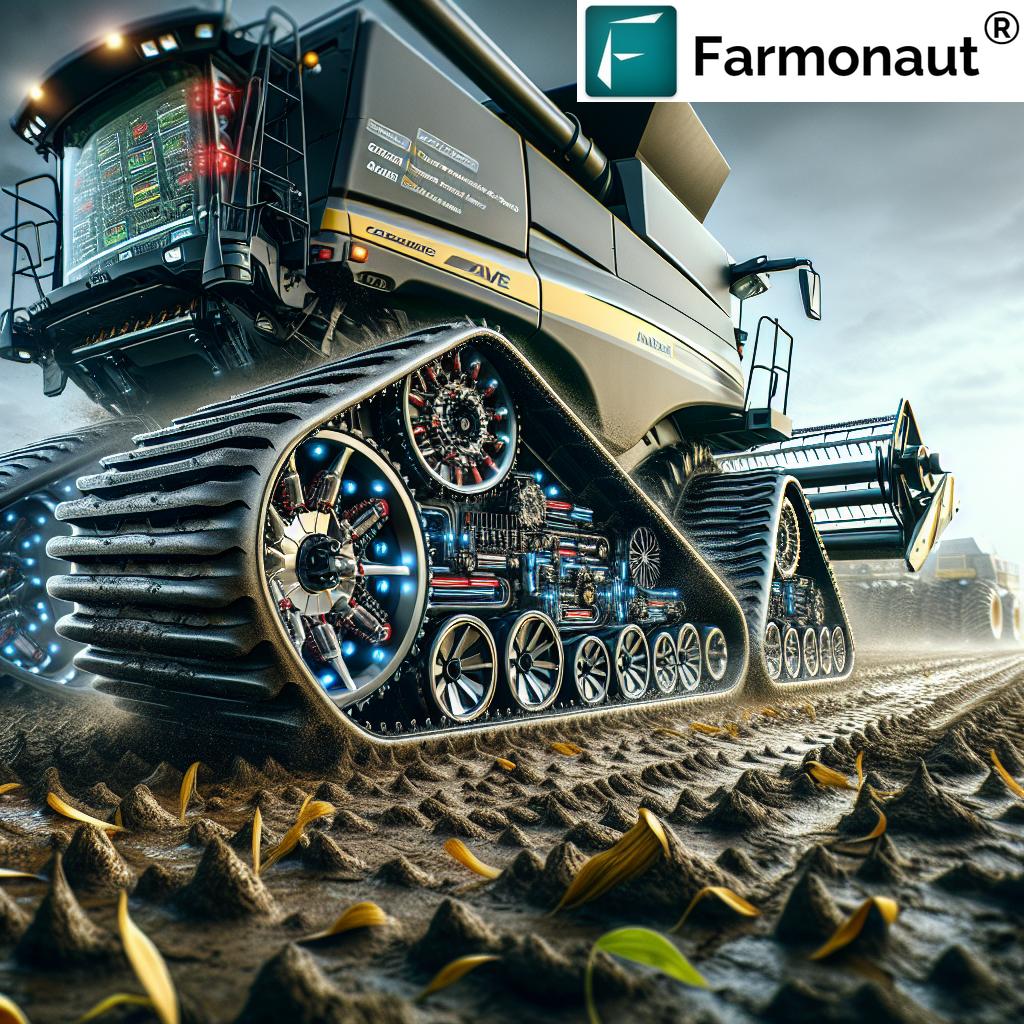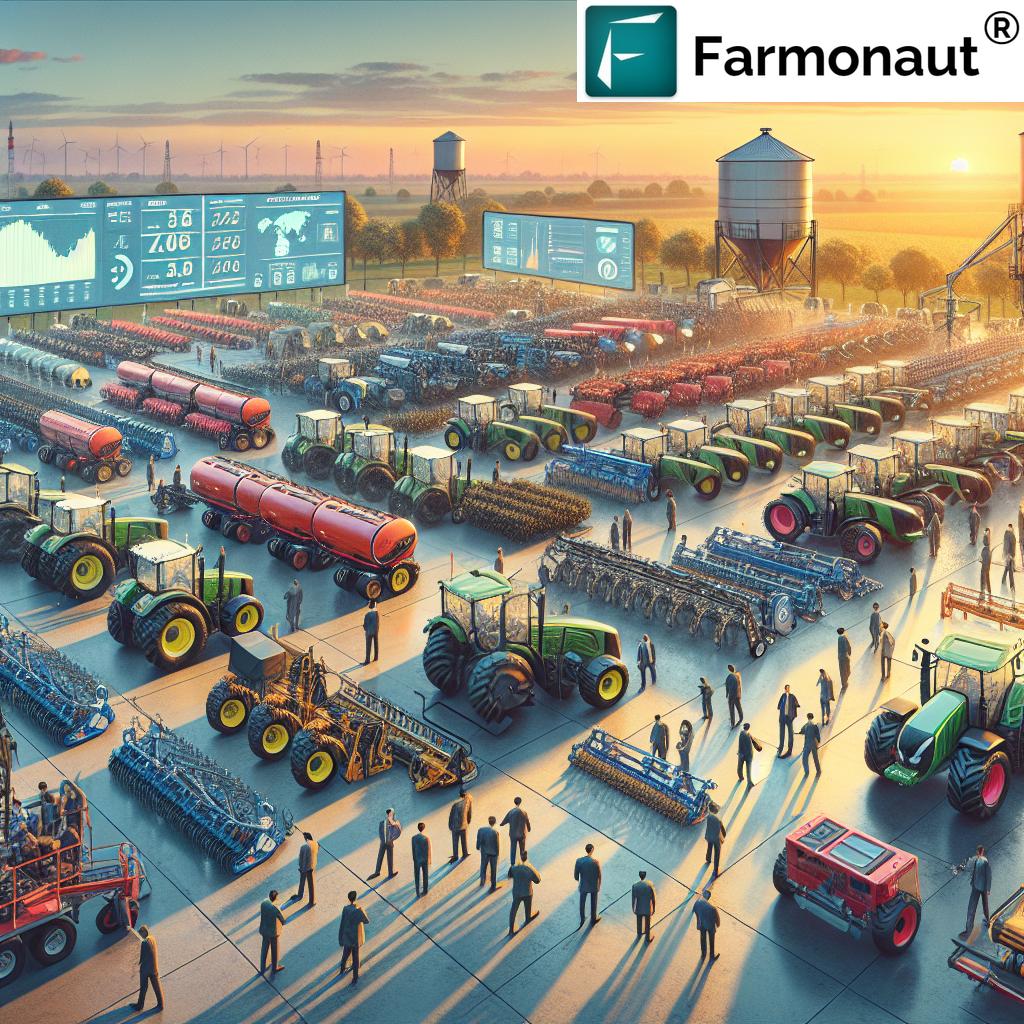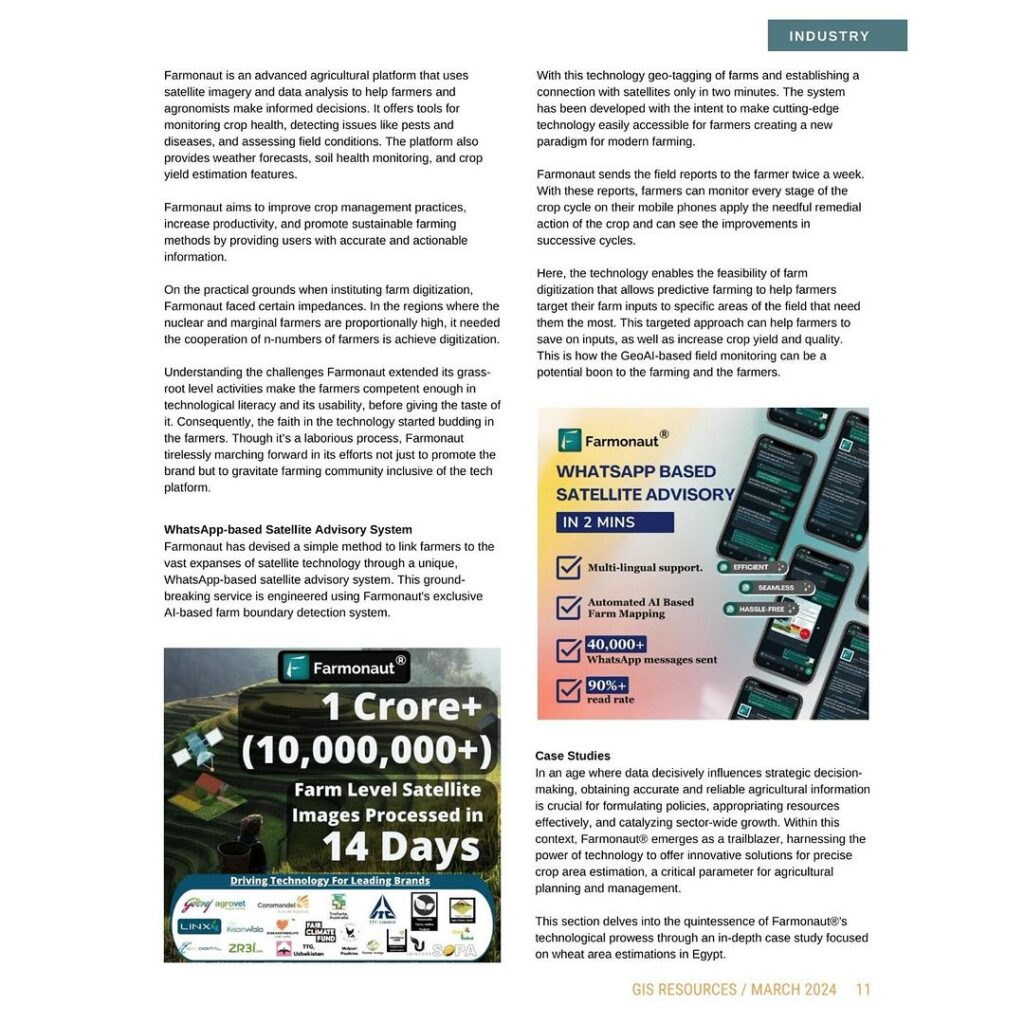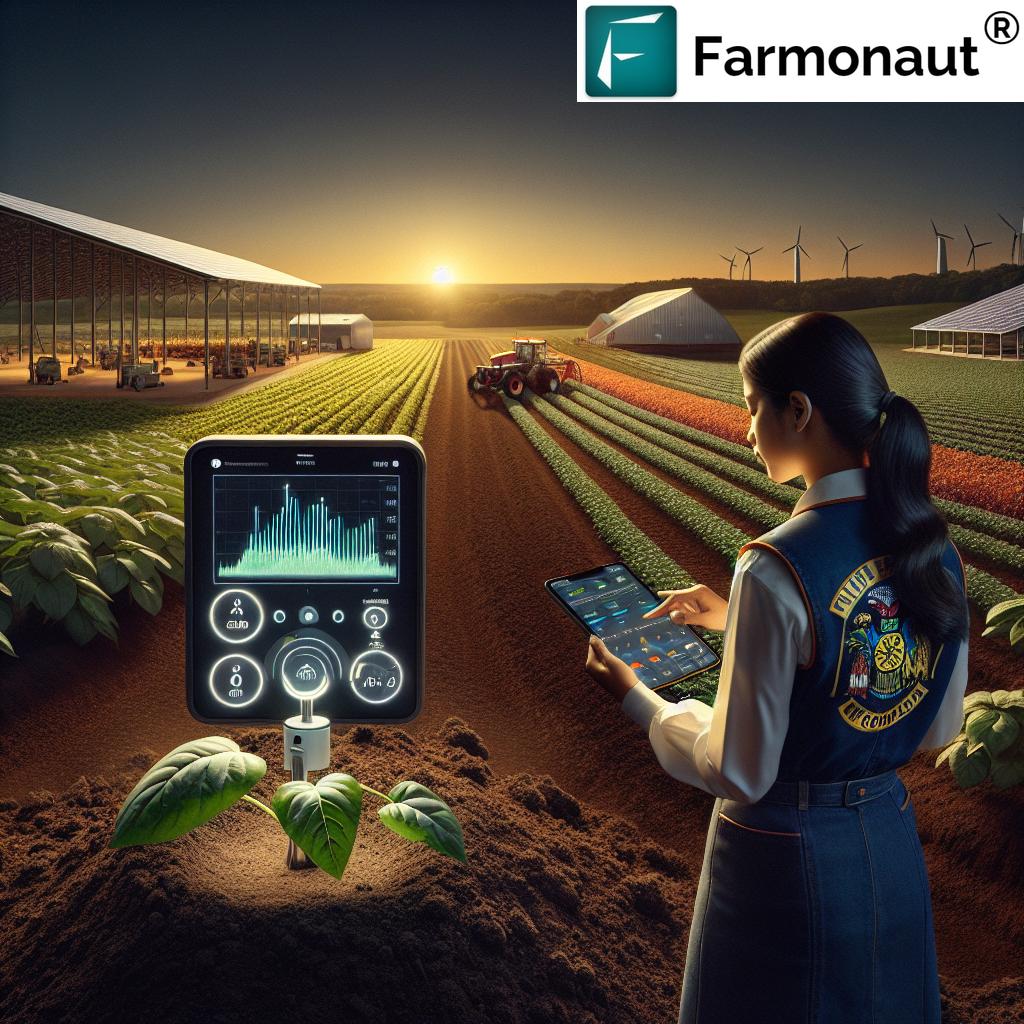Custom Agricultural Track Solutions: Boost Efficiency Fast
Discover how custom agricultural track solutions reduce soil compaction, improve traction, and boost equipment efficiency for sustainable farming success.
Table of Contents
- Introduction: The Future of Agricultural Mobility
- Understanding Custom Agricultural Track Solutions
- Key Advantages of Custom Track Solutions
- Improved Traction & Stability
- Reduced Soil Compaction
- Enhanced Equipment Longevity
- Improved Fuel Efficiency
- Adaptability to Diverse Terrains
- Benefits Comparison Table: Custom Tracks vs. Standard Tires
- Implementing Custom Agricultural Track Systems
- Assessment of Operational Needs
- Consultation with Manufacturers
- Compatibility & Cost Evaluation
- Maintenance & Support Considerations
- How Farmonaut Empowers Sustainable Agriculture
- Frequently Asked Questions (FAQ)
- Conclusion: Advancing Efficiency with Track Systems
“Custom agricultural track systems can reduce soil compaction by up to 40%, promoting healthier crop growth and higher yields.”
Introduction: The Future of Agricultural Mobility
In today’s rapidly evolving agriculture industry, efficiency and sustainability are not just buzzwords—they are indispensable goals driving global farming operations. As fields grow larger and demands for higher yields intensify, traditional wheels and machinery often face their limits, particularly in soft, muddy, or uneven terrains.
Custom agricultural track solutions have emerged as a technological leap forward, offering a sophisticated answer to the pressing challenges faced by modern farmers and forestry operators. By replacing traditional wheels with advanced track systems for agriculture, these specialized undercarriage systems are designed to boost tractor and harvester performance, reduce field compaction, and enable fully sustainable farming solutions.
Before we delve into the advantages and technical details, let’s briefly define what makes these custom solutions so revolutionary.
Understanding Custom Agricultural Track Solutions
Custom agricultural track solutions refer to tailored track and undercarriage systems engineered to fit the specific requirements of various agricultural machinery and forestry equipment. Unlike generic or standard alternatives, custom tracks are designed and manufactured for optimal compatibility, surface contact, and performance in challenging field conditions.
This customization enables machinery to tackle everything from deep mud and soft ground to steep slopes and diverse terrains. By distributing weight more evenly than wheels, track systems minimize soil compaction, leading to better soil health and crop outcomes.
From combine harvesters operating in wet fields to tractors on hilly vineyards and forestry operations in rugged landscapes, custom tracks ensure that the equipment maintains stability and efficiency for enhanced productivity, lower fuel costs, and a longer service life.
Let’s explore the exact benefits that place custom agricultural track solutions at the forefront of sustainable farming solutions worldwide.
“Advanced track solutions improve equipment traction by 30%, enabling efficient operation even in challenging field conditions.”
Key Advantages of Custom Track Solutions
1. Improved Traction and Stability
The primary advantage of track systems for agriculture is the larger surface area they provide in contact with the ground compared to traditional wheels. This design principle ensures weight distribution is even and steady, enabling machinery to operate efficiently on muddy, soft, or uneven terrains.
For example, combine harvesters equipped with custom rubber tracks can enter fields even when wet or boggy—reducing the risk of getting stuck and supporting timely harvesting. The effect? Not only faster and more reliable operations, but less downtime and lower risk of lost yields due to weather.
- Larger ground contact area prevents sinking in soft fields
- Consistent traction on muddy/steep/flooded terrains
- Stable movement for precise row-cropping and forestry applications
2. Reduced Soil Compaction in Farming
Soil compaction is a significant concern in both farming and forestry operations. Compacted soil restricts root growth, limits water infiltration, and can lead to decreased yields.
Custom tracks minimize this problem by distributing the equipment’s weight across a far larger area, leading to reduced soil compaction in farming. For instance, tracks engineered by leading manufacturers report up to 40% less compaction than equivalent-wheeled machinery.
- Preserves soil structure and health for sustained productivity
- Enhances crop yields by maintaining optimal root environments
- Lowers risk of water runoff and erosion
3. Enhanced Equipment Longevity & Reduced Maintenance
Custom track systems for agriculture are engineered specifically to withstand unique operational demands. Both heavy-duty steel tracks and flexible rubber tracks are tailored to take on intense pressure, challenging terrains, and repeated use, resulting in a longer service life for the machinery.
This durability translates to increased equipment longevity in agriculture, fewer repairs, and reduced maintenance costs over time.
- Decreased need for frequent part replacement
- Minimized breakdowns during critical farming operations
- Higher return on equipment investment
4. Improved Fuel Efficiency and Lower Operational Costs
Custom track solutions are designed for optimal compatibility and settings, leading to a reduction in slippage and wasted energy. By maximizing the traction to machine weight ratio, machinery can maintain efficient movement with less power required.
This results in improved fuel efficiency—with studies and manufacturer data suggesting up to 20% savings over standard wheeled systems. Lower fuel usage means both reduced costs and a smaller carbon footprint, making tracks a cornerstone for sustainable farming solutions.
- Up to 20% reduction in fuel consumption compared to wheels
- Increases number of acres covered per tank
- Lowers total cost of ownership
5. Adaptability to Diverse and Uneven Terrains
One of the standout features of custom agricultural track solutions is their adaptability. Tracks can be tailored to the unique needs of orchards, vineyards, rice paddies, and forestry operations—environments where standard wheels struggle.
By customizing the width, profile, rubber composition, and undercarriage design, manufacturers create adaptable tracks for uneven terrain that enable precision farming on steep hills, tight row crops, and even marshy or flooded fields.
- Navigate challenging slopes with stability
- Operate in narrow or irregular rows
- Access soft, wet, or previously inaccessible areas for more productive farming
Benefits Comparison Table: Custom Agricultural Track Solutions vs. Standard Tire Systems
| Feature/Metric | Custom Track Solutions (Estimated Values) |
Standard Tire Systems (Estimated Values) |
Benefit Impact |
|---|---|---|---|
| Soil Compaction Reduction (%) | Up to 40% | 0–10% | Promotes better crop health and yield—critical for sustainable farming solutions. |
| Traction Improvement (%) | 20% – 30% | Baseline | Enables reliable equipment performance on difficult terrains. |
| Fuel Efficiency Gain (%) | Up to 20% | Baseline | Reduces operational costs and carbon footprint. |
| Equipment Lifespan Increase (%) | Up to 30% | 0–10% | Extends machinery life, decreases replacement frequency. |
| Maintenance Costs (Estimated $/Year) | $1,500 – $3,500 | $3,500 – $7,000 | Lowered by fewer part replacements and breakdowns. |
Implementing Custom Agricultural Track Systems
While the advantages of custom agricultural track solutions are clear, implementing these systems successfully requires careful assessment and strategic decision-making, especially given the investment involved.
Assessment of Specific Operational Needs
Start by evaluating the terrain types, soil conditions, and core activities—harvesting, seeding, tilling, forestry—that define your agriculture or forestry operation. Important questions include:
- Do your fields get muddy/bogged during rainy seasons?
- Are you experiencing yield losses due to soil compaction?
- Is your current machinery struggling with traction or stability in wet or hilly areas?
This needs-based assessment helps define the performance goals your custom tracks must address.
Consultation with Specialized Track Manufacturers
Next, engage with manufacturers who specialize in agricultural machinery undercarriage systems, especially those with customization capabilities. Leading firms offer consultation and design services to ensure a perfect fit for your machine models and operational requirements.
- Discuss adapter plates and integration with your existing equipment
- Specify surface contact, track width, and preferred materials like rubber or steel
- Request data on field-tested traction improvement and soil compaction reduction
Remember, optimal compatibility between the track system and your equipment is essential for maximum benefits.
Evaluation of Costs, ROI, and Long-term Value
While custom agricultural track solutions often require a higher initial investment than standard wheels, their value lies in the substantial long-term savings and operational improvements:
- Lower maintenance costs
- Reduced fuel expenditures
- Increased equipment longevity and higher yields
- Improved crop health due to reduced compaction
A thorough cost-benefit analysis is necessary, factoring in savings over a 5-, 10-, or 15-year equipment lifespan.
For organizations concerned with environmental compliance or carbon tracking, Farmonaut’s Carbon Footprinting Solution offers advanced insights into the sustainability gains of adopting these innovations.
Maintenance and Ongoing Support
Sustaining the optimal performance of your track system requires a proactive maintenance plan. Select manufacturers with:
- Comprehensive maintenance packages
- Readily available spare parts for unique models
- Timely technical support and field service teams
By investing in preventive maintenance, owners further increase equipment longevity in agriculture and maximize the ROI of their custom track solutions.
Benefits of Rubber Tracks and Custom Track Materials
Choosing the right track material is essential:
- Rubber tracks: Provide smoother rides, lower vibration, less field damage—ideal for sensitive crops and precision fieldwork. Benefits of rubber tracks include lower compaction and enhanced equipment flexibility.
- Steel tracks: Offer maximum durability for the most extreme forestry or construction terrains, but may increase ground disturbance.
How Farmonaut Empowers Sustainable Farming with Data-Driven Solutions
At Farmonaut, we are dedicated to empowering efficient and sustainable agriculture by complementing the adoption of custom agricultural track solutions with advanced, satellite-based decision support tools. Our innovative platform enables farmers and agribusinesses to achieve:
- Precision monitoring of crop health and soil moisture via multispectral satellite images
- Real-time AI-driven advisory for optimal resource allocation
- Automated fleet and resource management for premium machinery efficiency
- Comprehensive traceability solutions for supply chain transparency in agriculture
- Support for crop loan and insurance verification integrating satellite-based evidence for lower risk and increased access to finance
- Carbon footprint tracking—enabling farmers to measure, reduce, and report their environmental impact after investing in new machinery or track systems
- Tools for large-scale farm management—coordinate advanced agronomic operations across thousands of hectares with a single dashboard
Our solutions are available via Android, iOS, web/browser apps, and robust API options for developers and agri-business users. For technical integrations, consult our developer documentation.
By leveraging Farmonaut’s tools alongside custom track solutions, farmers not only optimize equipment efficiency but also enhance overall field performance and sustainability, cementing a competitive advantage for the future of agriculture.
Frequently Asked Questions (FAQ): Custom Agricultural Track Solutions
-
Q: What is the main benefit of custom agricultural track solutions over standard wheels in farming?
A: Custom tracks provide a larger ground contact area, distributing equipment weight more evenly, which reduces soil compaction and improves traction. This enables efficient machinery operation in soft, muddy, or uneven terrains, leading to better crop yields and enhanced equipment longevity.
-
Q: Are custom agricultural track systems compatible with all types of farm equipment?
A: Compatibility depends on manufacturer design. Most leading manufacturers offer custom mounts, adapter plates, and engineering consultations for a wide range of agricultural machinery models. Always consult the track manufacturer to ensure optimal fit and integration with your specific equipment.
-
Q: How do custom track systems improve fuel efficiency?
A: By maximizing traction and minimizing slippage, custom tracks reduce energy waste and improve power transmission, often resulting in up to 20% less fuel consumption compared to standard wheeled equipment.
-
Q: What is the expected maintenance cost difference between tracks and tires?
A: Custom track systems generally have fewer maintenance issues related to soil ingress, punctures, and slippage. Over a year, estimated maintenance costs can be 40–60% less for tracked systems, especially with proper preventive care.
-
Q: Can adopting custom track solutions help my farming operation become more sustainable?
A: Absolutely. Reduced soil compaction preserves long-term soil health, improved fuel efficiency lowers emissions, and longer machinery life decreases waste. Custom tracks form an important step toward sustainable, resilient agriculture.
-
Q: How do I track the environmental and economic impact of adopting custom track solutions?
A: Use platforms like Farmonaut to monitor real-time crop health, soil moisture, and carbon footprint metrics before and after equipment upgrades. This data-driven approach quantifies ROI and sustainability improvements for your farm or forestry business.
Conclusion: Advancing Efficiency with Track Systems
In summary, custom agricultural track solutions offer a transformative pathway to enhanced efficiency, equipment longevity, and sustainability in agriculture and forestry operations. By adopting these specialized undercarriage systems, farmers and agribusinesses benefit from reduced soil compaction, improved traction across challenging terrains, and lower operational costs.
Through better compatibility, customization for diverse needs, and the use of advanced materials like rubber tracks, these solutions directly address the evolving challenges of modern farming. When paired with precision agriculture and decision support platforms such as Farmonaut, the results are amplified: smarter resource use, increased yields, and resilient, future-ready farm operations.
Embrace custom agricultural track solutions and drive your farming enterprise forward—toward greater profitability, sustainability, and technological leadership.


















